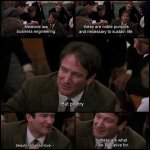Instead of trying to pick out one of countless associations between De Vere and the Shakespeare canon made by Anderson - and believe me the number of associations is mind boggling - I thought to ask simply about the Stratford man's passing. When Ben Jonson died in 1637 his death was well marked, so why did the Stratford man not enjoy the same treatment?
Should not the passing of "William Shakespeare" have been just as notable a passing as Jonson's? Why was it not?
No clue.

Moogly, (and Swammi, et al)
A few things:
First, I thought we were going to take it as a given that the Stratford Man was not the author of the Shakespeare canon - for the sake of argument in the thread? At least, that was what I proposed to Swammi in post # 219. I have already stated many times that
I am not interested in defending the Stratfordian position. I am interested in trying to be convinced that Oxford could have written Shakespeare; and, short of that, examine other candidates and see if anyone other than De Vere could have done it.
Thus, there is no reason for you to ask me about why Shakespeare's death went unnoticed. I do not know, and frankly, do not care. I said at the outset that I sort of agreed to what Bronzeage and DBT had pretty much said: that
a rose by any other name would smell as sweet - ie, that no matter who wrote Shakespeare, it is the WORK that has come down to us that matters. We know that
someone did it, right? Whether it was by committee, which I can almost guarantee is NOT the case, at least with respect to the parts that are absolutely brilliant, or by a single hand: alas and alack and welladay, that
is the question.
There is scant doubt that there were a number of different authors at various stages in some of the plays, whether Nashe, Fletcher and Beaumont, Marlowe, whoever: BUT, when it comes to a stretch of
tremendously good blank verse, like the following, we can rest assured that a
single hand did it:
(from Richard III, spoken by Gloucester)
Now is the winter of our discontent
Made glorious summer by this sun of York;
And all the clouds that lour'd upon our house
In the deep bosom of the ocean buried.
Now are our brows bound with victorious wreaths;
Our bruised arms hung up for monuments;
Our stern alarums changed to merry meetings,
Our dreadful marches to delightful measures.
Grim-visaged war hath smooth'd his wrinkled front;
And now, instead of mounting barbed steeds
To fright the souls of fearful adversaries,
He capers nimbly in a lady's chamber
To the lascivious pleasing of a lute.
But I, that am not shaped for sportive tricks,
Nor made to court an amorous looking-glass;
I, that am rudely stamp'd, and want love's majesty
To strut before a wanton ambling nymph;
I, that am curtail'd of this fair proportion,
Cheated of feature by dissembling nature,
Deformed, unfinish'd, sent before my time
Into this breathing world, scarce half made up,
And that so lamely and unfashionable
That dogs bark at me as I halt by them;
Why, I, in this weak piping time of peace,
Have no delight to pass away the time,
Unless to spy my shadow in the sun
And descant on mine own deformity:
- Shakespeare, Richard III, from the opening monologue
I could go on and post
thousands of lines of equal and even superior quality, but Shakespeare readers already know them.
Or do they?
This is what troubles me. This is what bothers me about Oxfordians. It seems to me that
in the main they are not accomplished poets themselves, and I know of several of them who have already demonstrated that they do not have an ear to apprehend the vast superiority of Shakespeare to nearly every other poet in English. There are a handful of notable poets who have come close, and I have given a few examples in the iambic pentameter thread: Milton, Keats, Tennyson, for sure, have climbed the steeps of Helicon to joust with the matchless Bard of Avon, only to lose in the end. As have Browning, Robinson, Frost, Stevens (Stevens especially), Eliot, Pound, and a host of others, many of them twentieth century poets. I could provide a LONG list of poets who have written excellent blank verse. Many were women. YAY!

And then there were masters like Dryden, Goldsmith, and Pope, who excelled in heroic couplets. To my mind, Alexander Pope may have matched Shakespeare with respect to sheer mastery of technique, but where Pope fails is in the aesthetic value of the work he left behind. Due to his insistence on loving a good joke over excellent poetry, and his snobbish need to roast authors he knew were inferior to himself, he became fixated on satire. There are the excellent Essay on Man and Essay on Criticism, plus the pastoral Windsor Forest, all excellent and absolutely top shelf, but the bulk of his work was in
scathing satire.
I have less respect and
little love for someone like Pope, who in my opinion wasted his talent in spiteful abandon, penning perfect rhyming couplets that were almost mathematically precise, and utterly flawless; but were they great works of art? Were they edifying and enriching to the mind and spirit? Or were they merely great artifacts, objectively superior in craftsmanship but ultimately not terribly inspiring? I suggest the latter is true.
What bothers me about this particular thread is that so far no-one but myself has stepped up to defend the Shakespeare canon for the
right reason, or let us say the
complete reason.
Shakespeare was not only a magnificent dramatist, a great wit, an intelligent and almost preternaturally perceptive student of human nature. He/she would have gone down in history
for those qualities alone. He/she would have been world famous even had no poetry at all happened in the plays. Indeed, the prose parts are often spectacularly entertaining, insightful, witty, funny,
downright hilarious, and they often rise to the heights of linguistic expression and almost flawless artistry. But where they reach truly breath-taking and sometimes astonishing beauty and power are in the sections of blank verse wherein the reader knows for certain that they are in the presence of unmatched genius. I argue that it is the quality of Shakespeare's poetry - and by that I do not refer to the sonnets, or to the narrative poems, though they are of a very high order - that sets that name higher than all the rest. I argue that it is because of the poetry that lives in the plays that the name of Shakespeare has remained large and on fire for more than four centuries, and why that flame will never perish as long as the English tongue survives.
So, what I need is to understand why and how it is that a merely adequate poet transformed into the greatest poet in English, and perhaps the greatest poet of all time. You have said, Moogly, that miracles don't happen, which is why you are content to believe that the Stratford man couldn't have written Shakespeare. But to my mind, if De Vere wrote Shakespeare, that constitutes
an even greater miracle.
That kind of a sea-change would be virtually without match in the history of English letters, as far as I am aware. I am no scholar, but am well read, and I know a bit about poetry written in English. I have mentioned Keats. But his stellar achievement was not miraculous, and a deep study of his work affirms stylistic continuity between his early poetry and the poetry of the great Odes, The Eve of St. Agnes, Lamia, and specifically, the Hyperion fragments. In a few years, and we mean
three or four, Keats went from a promising but awkward and imitative young poet to a singular genius who had mastered the art by a monumental effort, brought on by his supreme love of poetry and his awareness of an early death.
I imagine that this kind of a transformation would be possible for someone else; BUT, Swammi supplied a link to some poems he said were composed by the Earl of Oxford when De Vere was in his thirties. Those poems, while often quite good, were not even remotely close to the quality of Shakespeare. This is subjective, of course, but you simply will not find any person who understands poetry, who knows about meter, and about the finer points of versification, and who has an ear to apprehend and appreciate the musical, or strictly auditory, sonic value of contrived speech, who will opine that De Vere's skills as a poet were on par with Shakespeare,
or even close.
I hate to harp on it, but it is important, and especially in light of the fact that there are many people who do not have the ear to appreciate the beauty of great oratory, or great poetry. Then there are those who can appreciate it, but cannot do it. Then there are those who can appreciate and
almost do it. You know what I mean.
Think of Antonio Salieri and Mozart. Salieri, though a highly skilled composer, and appreciated by many (and unfairly characterized in the famous film) was able to grasp the superiority of Mozart's music, but could not compose on that level. Composing magnificent music was not difficult for Mozart, in fact it was easy for him. This was OH so frustrating for someone like Salieri (at least in the film! And the film works even though it takes liberties with reality) because he could hear, he could apprehend the majesty of Mozart's compositions, but despite his technical skill he could not compose the same way, on the same hyperboreal level.
Think of Frank Zappa. There are millions of fans who love Zappa, but due to an ordinary, earthbound grasp of music, will never fully comprehend, never totally apprehend, and
really understand, what sets Zappa apart from virtually everyone else in the popular music world, not only by virtue of his incredible native talent, along with his
learned understanding and mastery of music theory and formal notation, but by the (
apparent, to us mere mortals!) ease with which he composed and recorded, and the sheer
magnitude of his total output.
I sure as hell don't grasp it. Even someone like Steve Vai wasn't able to share the same space as Frank Zappa, and could only revere him and remain in comparative discipleship.
I must leave off right here - but I want to go back to one of
Bronzeage's posts, where he said something to the effect that to Shakespeare, the plays were "hack" work.
Work. He made
money from it. He was a business man.
Zappa was a business man also, and had a similar lofty detachment from the rest of the musical world. He was recognized in his lifetime as a genius but ultimately, while he himself recognized that he was probably a musical genius, he didn't make much of it. Making albums was something that not only made him millions, but satisfied his need to create music, at least partially. He had ambition. He wrote experimental music of all kinds, jazz, rock, what have you; but he also wrote orchestral music.
Have you heard any of Zappa's orchestral music? I owned an album recorded with the London Symphony. I admit I did not and COULD NOT appreciate it. I believe Zappa was not very satisfied with the experience, or with the product.
When asked, "How does one get the prestigious London Symphony to record their work?", Zappa replied in his point blank fashion:
"You
pay them."
More later. Please read this. I know it's lengthy.





